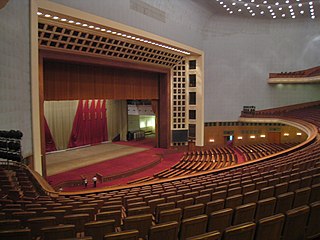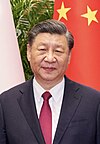
The State Council of the People's Republic of China, also known as the Central People's Government, is the chief administrative authority and the national cabinet of China. It is constitutionally the highest administrative organ of the country and the executive organ of the National People's Congress, the highest organ of state power. It is composed of the premier, vice premiers, state councilors, ministers of ministries, directors of committees, the auditor general, and the secretary-general.

The premier of the State Council of the People's Republic of China, commonly called the premier of China, is the head of government of China and leader of the State Council. The premier is the second-highest ranking person in China's political system, under the general secretary of the Chinese Communist Party /president, and holds the highest rank in the civil service of the central government.

The Standing Committee of the National People's Congress (NPCSC) is the permanent body of the National People's Congress (NPC), the national legislature of China. It exercises the powers of the NPC when it is not in session.
The orders of precedence in China is the ranking of political leaders in China for the purposes of event protocol and to arrange the ordering of names in official news bulletins, both written and televised. It is also sometimes used to assess perceived level of political power. Although there is no formally published ranking, there is usually an established convention and protocol, and the relative positions of Chinese political figures can usually be deduced from the order in meetings and especially by the time and order in which figures are covered by the official media. Since 1982, the General Secretary of the Chinese Communist Party has been the highest-ranking official in the People's Republic of China (PRC).

The Foreign Affairs Commission of the Central Committee of the Chinese Communist Party, commonly called the Central Foreign Affairs Commission, is a commission of the Central Committee of the Chinese Communist Party (CCP) that exercises general oversight on matters related to foreign affairs.

Li Keqiang was a Chinese economist and politician who served as the premier of the People's Republic of China from 2013 to 2023. He was also the second-ranked member of the Politburo Standing Committee of the Chinese Communist Party (CCP) from 2012 to 2022. Li was a major part of the "fifth generation of Chinese leadership" along with Xi Jinping, the CCP general secretary.

The government of the People's Republic of China is based on a system of people's congress within the parameters of a unitary communist state, in which the ruling Chinese Communist Party (CCP) enacts its policies through people's congresses. This system is based on the principle of unified state power, in which the legislature, the National People's Congress (NPC), is constitutionally enshrined as "the highest state organ of power." As China's political system has no separation of powers, there is only one branch of government which is represented by the legislature. The CCP through the NPC enacts unified leadership, which requires that all state organs, from the Supreme People's Court to the President of the People's Republic of China, are elected by, answerable to, and have no separate powers than those granted to them by the NPC. By law, all elections at all levels must adhere to the leadership of the CCP. The CCP controls appointments in all state bodies through a two-thirds majority in the NPC. The remaining seats are held by nominally independent delegates and eight minor political parties, which are non-oppositional and support the CCP. All government bodies and state-owned enterprises have internal CCP committees that lead the decision-making in these institutions.
The 5th Session of the 10th National People's Congress held its annual meeting from March 5 to March 15, 2007 at the Great Hall of the People in Beijing, China, in conjunction with the 2007 CPPCC. Many items were listed on the agenda for the two-week-long session of the National People's Congress. 2,937 delegates from every province and municipality attended, along with representatives from the People's Liberation Army. Among the delegations were those from the Special Administrative Regions of Hong Kong and Macau and a delegation representing Taiwan. Details on the election of these delegations can be found on the main article on the National People's Congress. The 2007 Session was chaired by Standing Committee Chairman Wu Bangguo, with the annual Government Report delivered by Premier Wen Jiabao. The 2007 Session also set the precedent of allowing foreign journalists to approach and interview any NPC members without restriction. All proposals and resolutions from the session for the first time were fully translated into English. The 2007 NPC formally approved the Property Law of the People's Republic of China which had been under discussion for the last several years. Shanghai party chief Chen Liangyu has been suspended and therefore did not participate in the NPC. However, Vice-Premier Huang Ju, who had been widely speculated in the Hong Kong media and Western sources to have fallen into political disgrace, though reported in the Chinese press as having been in bad health, made an appearance at the opening ceremonies on March 5. Huang genuinely appeared ill.

The 17th National Congress of the Chinese Communist Party was held in Beijing, China, at the Great Hall of the People from 15 to 21 October 2007. Congress marked a significant shift in the political direction of the country as CCP General Secretary Hu Jintao solidified his position of leadership. Hu's signature policy doctrine, the Scientific Development Concept, which aimed to create a "Socialist Harmonious Society" through egalitarian wealth distribution and concern for the country's less well-off, was enshrined into the Party Constitution. It was succeeded by the 18th National Congress of the Chinese Communist Party.

Li Zhanshu is a Chinese retired politician, who was the chairman of the Standing Committee of the National People's Congress from 2018 to 2023. He was the third-ranking member of the Politburo Standing Committee of the Chinese Communist Party, China's top decision-making body, between 2017 and 2022.

The Xi Jinping–Li Keqiang Administration is the administration of China from 2013 to 2023. Xi Jinping and Li Keqiang succeeded Hu Jintao and Wen Jiabao after the 12th National People's Congress.

Li Qiang is a Chinese politician. He became the 8th premier of the People's Republic of China in March 2023, having been elevated to the second-ranking member on the Chinese Communist Party (CCP) Central Committee Politburo Standing Committee in October 2022. Li was the party secretary for Shanghai City from 2017 to 2022 where he pursued pro-business policies and handled the response to the COVID-19 pandemic.

The National People's Congress (NPC) is the highest organ of state power of the People's Republic of China. The NPC is the only branch of government in China, and per the principle of unified power, all state organs from the State Council to the Supreme People's Court (SPC) are subservient to it. With 2,977 members in 2023, it is the largest legislative body in the world. The NPC is elected for a term of five years. It holds annual sessions every spring, usually lasting from 10 to 14 days, in the Great Hall of the People on the west side of Tiananmen Square in Beijing.

The 19th National Congress of the Chinese Communist Party was held at the Great Hall of the People, Beijing, between 18 and 24 October 2017. 2,280 delegates represented the party's estimated 89 million members. Preparations for the 19th National Congress began in 2016 and ended with a plenary session of the Central Committee a few days prior to the Congress. In 2016, local and provincial party organizations began electing delegates to the congress as well as receiving and amending party documents. It was succeeded by the 20th National Congress of the Chinese Communist Party.

The 2018 National People's Congress, or the First Session of the 13th National People's Congress, was held in March 2018 at the Great Hall of the People in Beijing, China. The session opened on 5 March and concluded on 20 March. Major state positions were elected in this session.

The 20th National Congress of the Chinese Communist Party (CCP), commonly referred to as Èrshí Dà, was held in the Great Hall of the People, Beijing from 16 to 22 October 2022. The National Congress is the highest organ of the party, and is stipulated to be held every five years. The conference had 2,296 delegates and 83 specially invited delegates.
The 20th Politburo of the Chinese Communist Party (CCP), formally the Political Bureau of the 20th Central Committee of the Communist Party of China, was elected at the 1st Plenary Session of the 20th Central Committee of the CCP on 23 October 2022 in the aftermath of the 20th National Congress. This electoral term was preceded by the 19th Politburo. Seven of the 24 members serve in the 20th Politburo Standing Committee.
The 2023 National People's Congress, officially the First Session of the 14th National People's Congress, was held in March 2023 at the Great Hall of the People in Beijing, China. The session opened on 5 March and concluded on 13 March. Major state positions of China were elected in this session.

The 14th National People's Congress (NPC) is the sitting electoral term of the "supreme organ of state power" of the People's Republic of China. It convened in Beijing, on 5 March 2023, and is scheduled to continue until March 2028. Elections for the new Congress were held from October 2022 to February 2023. It is scheduled to hold five sessions in this period, occurring around early March every year until before 2028, when the 15th National People's Congress is expected to be elected from December 2027 to February 2028 and will likely be in session around March 2028.

The Li Qiang Government, officially the 14th State Council of the People's Republic of China, is the Central People's Government of China from 2023. Premier Li Qiang took office on 11 March 2023 and it succeeded the Li Keqiang Government. Premier Li is ranked only second to General Secretary of the Chinese Communist Party Xi Jinping among 7 members of the 20th Politburo Standing Committee, the top decision-making body of the Chinese Communist Party (CCP).















